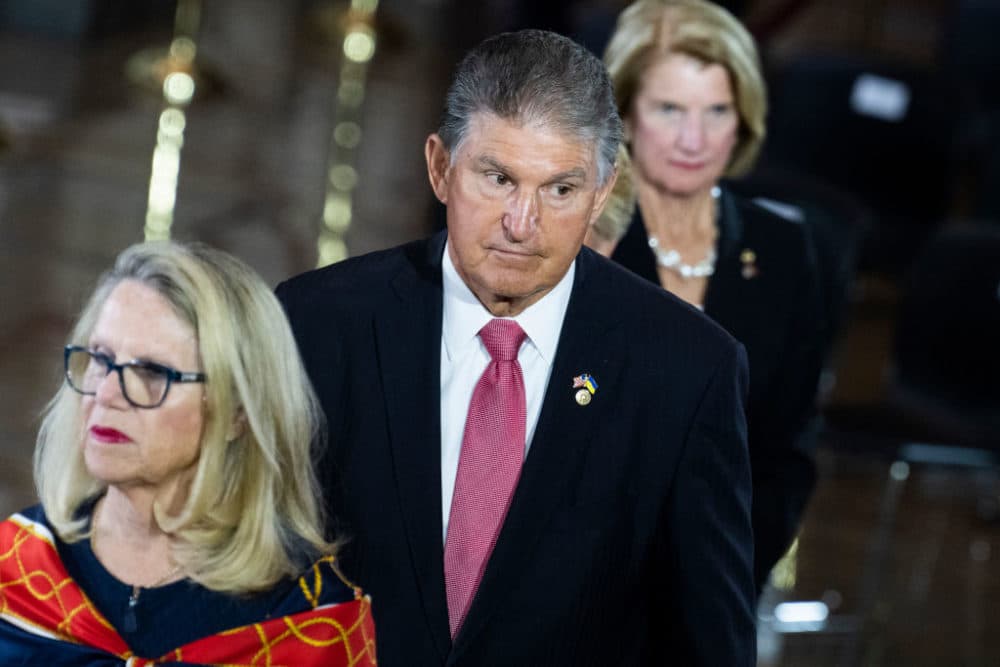Advertisement
Commentary
It's Joe Manchin's world

Sen. Joe Manchin’s ultimate rejection of long-negotiated provisions in the reconciliation bill landed with a seismic thud on the Democratic climate agenda last week, jarring the nation off the path toward clean energy.
The whim of the small-state senator points to more than just another political setback for the Biden administration. Manchin’s decision to ally himself with his 50 Republican colleagues will bear heavily on the rate at which our economy can be decarbonized and on the ability of the U.S. to lead the world on climate policy.
And most significantly, it portends a future in which fossil fuels remain prominent in the global energy mix, despite their inherent harms.
A recent analysis from the Rhodium Group found that current U.S. policies won’t meet President Biden’s goal of reducing carbon emissions to half of the 2005 level by 2030. Provisions for wind and solar energy in the reconciliation bill — unacceptable to Manchin— would have substantially accelerated the nation’s reduction of carbon emissions. Incentives for electric vehicles, which Manchin vociferously opposed, would have opened up opportunities for EV ownership to middle-to-low-income buyers much sooner than otherwise. The absence of those measures may cause automakers to dial back the pace of their transition to all-electric fleets.
The rate of decarbonization matters because humanity depletes its remaining carbon budget with each passing year. The more fossil fuels we consume in the next 10 years, the faster emissions must subsequently decline to avoid the worst impacts of warming. If they don’t fall rapidly enough to keep cumulative carbon pollution below a critical threshold, then today’s efforts only postpone catastrophic outcomes.
The economic fallout of slowing down our transition to clean energy belies Manchin’s professed concern for the budgetary consequences of the climate measures he just rejected. Failing to curb fossil fuel use will necessitate future spending throughout the economy for adapting to damages related to extreme weather. A recent government report says the cost of wildfires, flooding, hurricane damage, heat waves and droughts will approach trillions of dollars annually in the U.S. by the end of the century. Additional spending for climate resilience will cut into funding for essential investments in carbon-free energy sources that address the root cause of the climate crisis.
The intangible costs of Manchin’s capriciousness will also play out on the international stage, where the lack of a credible legislative accomplishment to crow about undermines the ability of the U.S. to lead on global climate policy.
The U.S. delegation will arrive empty-handed at the COP 27 climate conference in Egypt this November. The failure to pass robust climate legislation, combined with the recent Supreme Court decision that hamstrings the Environmental Protection Agency, leaves U.S. negotiators with little leverage to demand that India and China strengthen their emissions reduction pledges. And the U.S. is still lagging on national targets it set in the Paris Agreement of 2015.
In [Manchin's] world, fossil fuels will continue to be a highly-profitable strategic commodity and a source of geopolitical conflict
Perhaps most distressingly, Manchin handed a victory to those whose conception of the broadly agreed-upon target of net-zero carbon emissions by 2050 leaves intact much of the fossil fuel industry as it currently exists.
For most people in the climate movement, a net-zero world means a more benign economy, powered primarily by renewable energy, that treads lightly on the planet’s ecosystems. It means building advanced electrical grids that can deliver clean electricity wherever needed and cutting energy demand with more efficient heating and cooling technologies. It means cleaning up the transportation sector with better infrastructure for public transit, cycling and pedestrians, along with the transition to electric vehicles. And it means reforming agriculture to produce our food more sustainably.
But Manchin and his masters — along with the entire Republican party — have a different idea of what a net-zero world looks like. They argue against the rapid adoption of electric vehicles and renewable energy. Their approach is to continue fracking, extracting and burning increasing amounts of fossil fuel, with the addition of expensive and unproven technology to remove the resultant greenhouse gases from the atmosphere. They advocate carbon offset schemes and entire new industries to capture and store carbon dioxide from the smokestacks of power plants and directly from the air. Failing that, they say we can resort to blocking the sun.
In their world, fossil fuels will continue to be a highly-profitable strategic commodity and a source of geopolitical conflict, a lever for autocrats and warmongers.
When Biden took office, it was reasonable to believe that at least some of the progressive agenda he ran on was within reach. With the defeat of the final few climate initiatives that remained on the table until last week, it appears the guardians of the fossil-fuel status quo have won this round. The opportunity for durable transformative change may not arise again soon.
As much of Europe and North America roasts in a blistering heat wave, our best hope is that the widely unpopular actions from the right this year — on guns, abortion and climate — will evoke a retaliatory response at the polls this November. As author and activist Bill McKibben exhorts, it’s now up to all of us to be the backlash.
